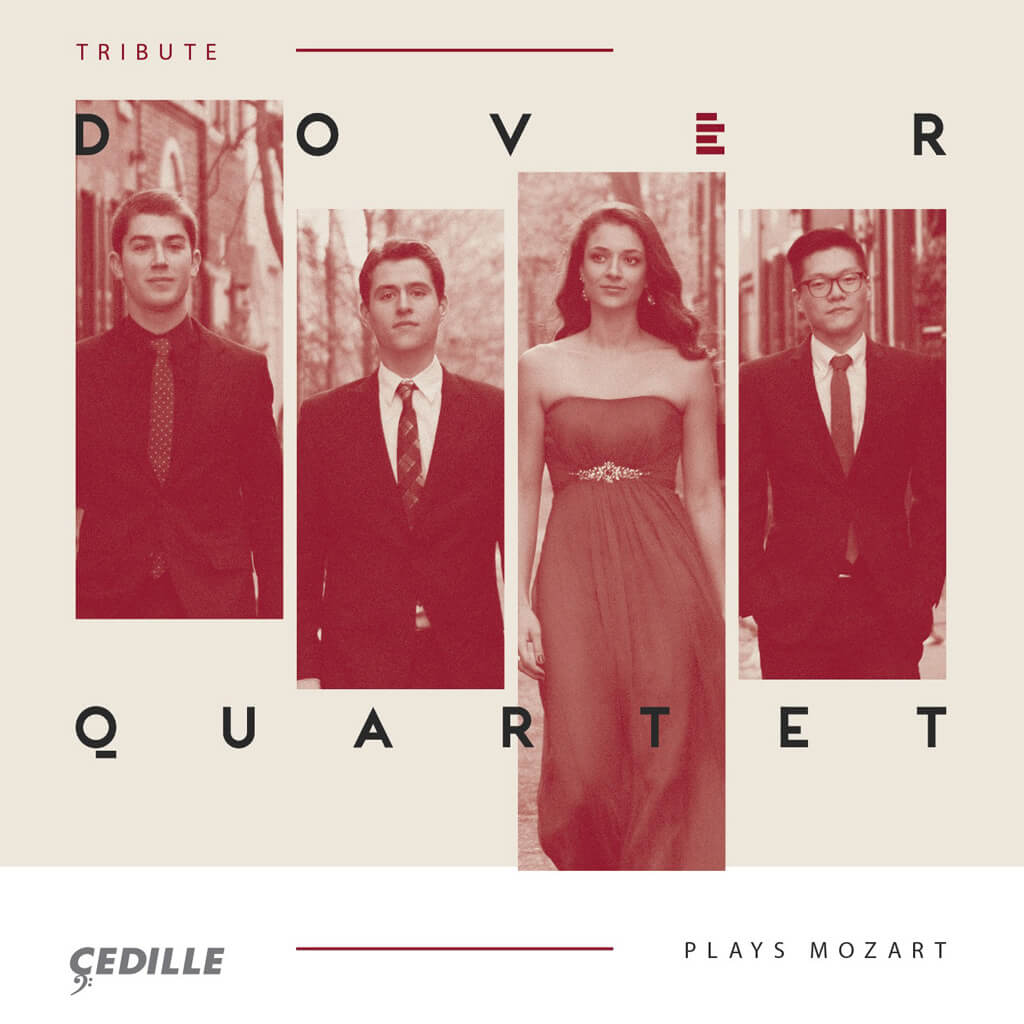
Alberta’s Banff International String Quartet Competition (BISQC) is one of the most prestigious in North America, and in 2013 the Dover Quartet (DQ) absolutely ran away with nearly all the awards, including the Grand Prize. Three years later this exciting young ensemble is storming the world and will make an eagerly-awaited appearance in Toronto at Koerner Hall on February 11, 2017. This new recording provides a timely calling card for Toronto music-lovers.
Founded in 2008 at the Curtis Institute in Philadelphia where all four members were studying at the time, the Dover Quartet moved on as a group to the Shepherd School of Music at Rice University (Houston, Texas) for further study. At Curtis, their most important mentors included members of the Guarneri Quartet (1964-2009), for whom this Mozart album was conceived as a tribute.
The Guarneri Quartet (GQ) made its first recording, which included Mozart’s last two string quartets, in 1966; now, 50 years later these same works are featured on the Dover Quartet’s first recording. To honour the bond even further, the Dover invited GQ violist Michael Tree to join them in Mozart’s String Quintet in C minor. Eighty-one years old when he took part in this recording, Tree clearly hasn’t lost a step.
The amount of talent, hard work, sacrifice and serendipity it takes to create a successful string quartet cannot be underestimated. Just imagine trying to find four top-notch musicians who are good enough to play some of the most difficult music ever written — starting with Beethoven, Bartók and Shostakovich – and willing to work together as a group. In addition to the “top-notch” and “willing” requirements, all four players must match each other’s sound and style of playing. Ultimately, the four must be compatible on a personal level, as they are likely going to be spending more time together than with their wives or husbands. On top of that, each must be willing to work day and night for weeks on end with no pay, in the knowledge that even if their quartet is successful, cutting a concert fee four ways after expenses means that as individuals, they are unlikely to reap a “substantial” financial reward.
As far as the Dover Quartet is concerned, all we can say at present is that after five years, the signs are very good that they can make a go of it. All the members of the group — Joel Link and Bryan Lee, violins, Milena Pajaro-van de Stadt, viola, and Camden Shaw, cello — are first-rate musicians and it likely helped that they had the same pedigree; that is, they studied at the same schools, and were taught and mentored by the same people, many of whom had decades of experience playing in successful quartets such as the Guarneri, the Cleveland, and the Vermeer.

Clearly a winner, the DQ’s debut recording gives us good, old-fashioned Mozart. No doubt aware of historical performance practice, they chose to play Mozart much as the Guarneri did before them, with beauty of sound, graceful phrasing, and tempos that allow the music to be heard at its best. In short, the DQ is not attempting to break new ground in its Mozart playing; rather, it is placing itself squarely in the great tradition of fine quartet playing, looking back to the Guarneri as their model, just as the Guarneri had looked back to the Busch and Budapest string quartets.
As much as I enjoyed the performances of the two late Mozart quartets, I enjoyed the C minor String Quintet even more, perhaps because I feel it is a greater work. Mozart composed this piece in 1782 as the Serenade in C minor K. 388 for Wind Octet. Cellist Camden Shaw, who wrote the excellent notes for this CD, points out that Mozart must have thought highly of the piece and “reimagined” it for string quintet. Obviously, nothing musical was too difficult for Mozart, but wouldn’t it be a fascinating exercise for students at, say, the Faculty of Music, University of Toronto to undertake the following assignment: take Mozart’s Serenade K. 388 for eight wind instruments (2 oboes, 2 clarinets, 2 bassoons and 2 horns) and transcribe it for five string players i.e. a string quartet with an extra viola. Wouldn’t it be illuminating for the students to then compare their transcriptions with what Mozart had done?
The String Quintet in C minor, as befits its key, is very much an Eighteenth Century Sturm und Drang piece. Dramatic from the opening bars, it is filled with sounds of pain and struggle. It has extraordinarily moving quiet moments as well, and the string quintet version is much more successful than the wind octet version at expressing depths of emotion in these episodes.
The Dover Quartet and Michael Tree get more out of this music than I can remember hearing in any previous performance. But they do it not by being different. One never feels that the music is being pushed or pulled to try to make it more exciting or more profound. They know exactly when to take their time — tempo a little slower, pauses a little longer — and when to push ahead. This is glorious music-making and I enjoyed every minute of it. May the Dover Quartet endure for 45 years, as their mentors in the Guarneri did before them.
[Corection: Dec. 12. A previous version stated the Dover Quartet studied with the Guarneri Quartet at Rice, but was in fact at Curtis.]
For more Record Keeping see, here.
#LUDWIGVAN
Want more updates on Toronto-centric classical music news and review before anyone else finds out? Follow us on Facebook or Twitter for all the latest.
- SCRUTINY | TSO Lets Berlioz Do The Talking In Season Opener - September 21, 2018
- RECORD KEEPING | Even Yannick Nézet-Séguin Can’t Make Us Love Mozart’s La Clemenza di Tito - September 6, 2018
- RECORD KEEPING | Giovanna d’Arco With Anna Netrebko Explains Why The Best Operas Survive - August 30, 2018



